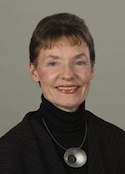UW to serve as national hub for mentor training as part of diversity consortium
The University of Wisconsin–Madison will serve as a national hub for research mentor and mentee training for the National Research Mentoring Network (NRMN) recently announced by NIH as part of a national Diversity Program Consortium.
The NIH will award the Diversity Program Consortium nearly $31 million in fiscal year 2014 funds to develop new approaches that engage researchers, including those from backgrounds underrepresented in biomedical sciences, and prepare them to thrive in the NIH-funded workforce.

Christine Sorkness
The UW has led the nation in developing, evaluating and disseminating evidence-based curricula to train research mentors and mentees in establishing effective mentoring relationships. Because of its dedication and a decade of existing work done at the university, the UW has been awarded $2.2 million by the NIH to establish the NRMN Mentor Training Core. The overall award to develop and support NRMN is $19 million over five years.
“Our nation needs model programs of support for mentors and mentees — programs that are informed by research and built to promote the academic and career outcomes needed to maintain our international leadership in biomedical sciences,” says Christine Sorkness, co-investigator for the UW site and senior associate executive director at the UW Institute for Clinical and Translational Research (ICTR).

Christine Pfund
“We’ve developed models and performed the research to show they work. NRMN is the perfect opportunity to collaborate more widely, capitalize on cross-campus initiatives, and share what we’ve learned,” says Christine Pfund, principal investigator of NRMN, director of the NRMN Mentor Training Core and researcher with the Department of Medicine, UW ICTR, and the Wisconsin Center for Education Research.
NRMN will be a nationwide consortium to enhance the training and career development of individuals from diverse backgrounds, communities and cultures who are pursuing biomedical, behavioral, clinical and social science research careers through networking and mentorship experiences. A primary goal of NRMN is to address the disparities in the full participation of biomedical research by underrepresented minorities.
NRMN will also partner with over 30 professional scientific societies and numerous colleges and universities, including 20 historically black colleges and universities, a consortium of Hispanic-serving institutions, organizations supporting tribal colleges, numerous minority-serving organizations, and NIH-funded centers.
“We have shown mentoring relationships can be made more effective through training. The training through NRMN will focus on preparing culturally responsive mentors … ”
Christine Pfund
The NRMN Mentor Training Core at UW–Madison will be directed by Pfund, the principal investigator. Other cores include the Administrative Core (Boston College, David Burgess, lead PI, and Morehouse School of Medicine, Elizabeth Ofili, PI); the Mentorship and Networking Core (University of North Texas Health Sciences Center, Jamboor Vishwanatha, PI); and the Professional Development Core (University of Minnesota; Kola Okuyemi, PI).
The UW Mentor Training Core will provide career-stage appropriate training for mentors and mentees. The approach is tailored to foster the persistence and success of a diverse group of biomedical researchers, with a specific focus on deepening the alignment and impact of these mentoring relationships. The evidence-based activities included in this core are designed to facilitate trusting mentoring relationships that support underrepresented minority scholars as they navigate their education.

Janet Branchaw
“Success of the apprenticeship model of research training relies heavily on effective mentoring relationships that foster mentees’ interest, motivation and preparedness for research careers,” says Janet Branchaw, assistant professor in kinesiology, director of WISCIENCE, and associate director of the NRMN Mentor Training Core. “However, the pressure to meet productivity and funding demands in academic science, coupled with a lack of preparation to work with diverse trainees, has created challenges to effectively mentoring the next generation of scientists.”

Angela Byars-Winston
“Mentoring can make a huge difference, but simply creating more mentoring opportunities isn’t the answer. We have shown mentoring relationships can be made more effective through training,” Pfund continues. “The training through NRMN will focus on preparing culturally responsive mentors and builds on the work of Dr. Angela Byars-Winston, associate professor of medicine and member of the NRMN Mentor Training Core.”
Mentoring research at UW–Madison has been supported by the National Science Foundation, the Howard Hughes Medical Institute, and multiple NIH grants, including those to the UW Institute for Clinical and Translational Research through the Clinical and Translational Science Award program.
Prior mentor and mentee training initiatives and research at UW–Madison engaged dozens of faculty and staff through:
- Delta Program in Research, Teaching and Learning (Delta)
- Wisconsin Program for Scientific Teaching (WPST)
- Wisconsin Institute for Science Education and Community Engagement (WISCIENCE)
- Center for Women’s Health Research
This work has been funded for more than a decade by Howard Hughes Medical Institute, the National Science Foundation, and the NIH.
Training and evaluation of mentors for biomedical researchers is a priority of the mentoring research team at UW ICTR and has been funded by the NIH Clinical and Translational Science Award (CTSA) that supports ICTR, as well as by several competitive supplements to the original award.
The NRMN Mentor Training Core leadership team includes Christine Pfund, Ph.D. (PI, UW–Madison); Janet Branchaw, Ph.D. (UW-Madison); Angela Byars Winston, Ph.D. (UW-Madison); Richard McGee, Ph.D. (Northwestern University); Sandra Quinn, Ph.D. (University of Maryland School of Public Health); Christine Sorkness, PharmD (UW-Madison); Stephen Thomas, Ph.D. (University of Maryland School of Public Health); and Anne Marie Weber-Main, Ph.D. (University of Minnesota), among other team members who are part of the UW ICTR mentoring initiatives.
Tags: biosciences, diversity, health & medicine, research




